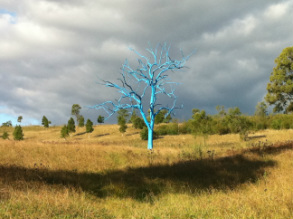About Us:
Research in the lab embraces the idea that increasing our understanding of plant physiological controls over carbon, water, and nutrient transport between soils, plants, and the atmosphere are of critical importance for understanding how natural and human reconfigured ecosystems respond to a changing climate.
Lab Updates:
- February 2021, Working with Guillaume Théroux-Rancourt, Adam B. Roddy and others we published a paper in the recent issue of The Proceedings of the Royal Society B showing "that genome downsizing among the angiosperms was critical to restructuring the entire pathway of CO2 diffusion into and through the leaf". you can download it here
- November 2020, Paper describing the impact of leaf hydraulic design on the isotopic composition of leaf water was accepted for publication in Plant, Cell and Environment
- January 2020, New paper describing the impact of genome-cellular allometry on the internal anatomy of leaves and the internal conductance of CO2 is now available as a pre-print on bioRxiv.
- January 2020, New paper describing how changes in genome size scale up to higher order physiological and ecological processes was published as part of a Special Issue on Functional Trait Evolution in the International Journal of Plant Sciences
- February 2019, Research comparing the water relations of flowers and leaves was published in New Phytologist
- December 2018, Funded by the California Department of Fish and Wildlife to investigate the influence of contemporary restoration on the carbon sequestration capacity of montane meadows.
- September 2018, Funded by NSF to investigate Rules of Life
- March 2018, Research investigating relationships between hydraulic conductance, capacitance and embolism resistance of Calycanthus flowers was published in Plant, Cell and Environment
- January 2018, Quanta magazine feature about research on plant genome size.
- January 2018, Interview with the BBC World Service, Science in Action series, about recent research on the physiological mechanisms contributing to the global dominance of flowering plants.
- January 2018, "Genome downsizing, physiological novelty, and the global dominance of flowering plants" is now available at PLoS Biology
- December 2017, Research investigating the physiological mechanisms driving the global success of Angiosperms was accepted by PLoS Biology and is currently in press. "Genome downsizing, physiological novelty, and the global dominance of flowering plants"
- November 2016, Karen Loucos published a paper in Plant, Cell and Environment investigating the coordination between water and CO2 transport inside cotton leaves.
- July 2016, Erin Lockhart published a paper in Functional Plant Biology investigating carbon allocation among metabolite pools in Phaseolus vulgaris
- May 2016, Millicent Smith published a paper in Plant and Cell Physiology investigating the carbon isotope composition of carbohydrates and polyols in leaf and pholem sap.
- May 2016, A research review of stable isotopes in leaf water was published in Plant, Cell and Environment.
- May 2016, New research published in New Phytologist investigating changes in mesophyll conductance of C4 and C3 plants as leaves age
- January 2015, Karen Loucos published a paper in Tree Physiology that investigates the potential pitfalls associated with leaf water enrichment model assumptions.
- December 2014, New research published in the Journal of Experimental Botany investigating environmental and physiological controls over leaf hydraulic conductance.
